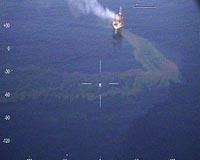 |
Oslo (AFP) Nov 4, 2009 Norwegian energy group Statoil said Wednesday it was selling some of its US offshore oil assets to China's state-owned CNOOC, marking the first step by a Chinese energy major into the US market. The sale, announced along with Statoil's quarterly results, involves a limited stake for the China National Offshore Oil Corporation (CNOOC) in four exploitation licences for deepwater blocks bought in 2007 and 2008. "On 29 October Statoil signed a farm down agreement with the Chinese company CNOOC involving a number of Statoil's leases in the Gulf of Mexico," Statoil said in its third-quarter earnings statement. Statoil, which is 67 percent state-owned, declined to disclose the value of the transaction but spokesman Kai Nielsen told AFP that the size of the deal was "very small." In 2005, CNOOC had to cancel an 18.5-billion-dollar (12.4-billion-euro) deal with US firm Unocal because the politics of a communist country buying key US assets proved too controversial for Capitol Hill. "It came to signify the general struggle between the US and China," Kurt Barrow, a senior partner at energy consulting firm Purvin and Gertz in Singapore, told AFP at the time. "CNOOC may have lost the battle but it will not give up the war," Barrow added, illustrating analysts' predictions that the Chinese would take another bid at entering the US market, dominated by American and European companies with more political clout. The sale announced Wednesday took place in the context of a slowdown in offshore oil exploration caused by the global credit crunch, an environment in which "opposition to Chinese investment may be less likely," the Wall Street Journal said last month. CNOOC will be acquiring 20 percent of the Tucker prospect and a 10-percent stake on the licences of the Krakatoa, Cobra and Logan blocks, while Statoil will remain the operator of all four blocks. "In the Gulf of Mexico, it is customary to optimise the portfolio and spread risk involved in exploration drilling efforts," Statoil's spokesman said. In its earnings statement on Wednesday, the firm reported a 13.9-percent rise in profits, largely due to financial items including currency effects, but it voiced caution about the prospects for an economic recovery. "Although we see signs of improvement in the global economy, there is no firm evidence that industry investment, employment and private consumption have recovered in a sustainable way," chief executive Helge Lund said. "This calls for cautiousness. Statoil is continuing to reduce costs, and we still have the flexibility to adjust our activity in response to a volatile business environment," he added. Statoil's net profits came to 7.4 billion kroner (1.3 billion dollars, 872.2 million euros) compared to 6.5 billion kroner in the same quarter last year. Despite the improvement, the firm did not meet the expectations of analysts quizzed by Dow Jones Newswires, who predicted a net profit of 8.45 billion kroner. But it fared relatively better than its French rival Total, whose net profits fell 54 percent in quarterly earnings also revealed Wednesday. Like Total, Statoil suffered from plunging oil prices. Its eight percent increase in production to 1.874 million barrels of oil-equivalent per day was not enough to compensate for falling prices. Translated into Norwegian kroner, oil prices fell by 31 percent, gas prices by 32 percent and refining margins by 59 percent over the past year. At 1210 GMT, Statoil's share prices were up 2.73 percent to 139.4 kroner in a market up 2.25 percent. Share This Article With Planet Earth
Related Links Powering The World in the 21st Century at Energy-Daily.com
 Australian oil spill recovery plan could take 7 years: company
Australian oil spill recovery plan could take 7 years: companySydney (AFP) Nov 4, 2009 Monitoring the clean-up of a huge oil spill in pristine Australian waters could take as long as seven years, an official said Wednesday as environmentalists urged a wide-ranging inquiry into the disaster. As many as 28,000 barrels of oil have gushed into the Timor Sea off Western Australia's northern coast in the 10 weeks since the West Atlas oil rig began leaking, raising concerns of an ... read more |
|
| The content herein, unless otherwise known to be public domain, are Copyright 1995-2009 - SpaceDaily. AFP and UPI Wire Stories are copyright Agence France-Presse and United Press International. ESA Portal Reports are copyright European Space Agency. All NASA sourced material is public domain. Additional copyrights may apply in whole or part to other bona fide parties. Advertising does not imply endorsement,agreement or approval of any opinions, statements or information provided by SpaceDaily on any Web page published or hosted by SpaceDaily. Privacy Statement |